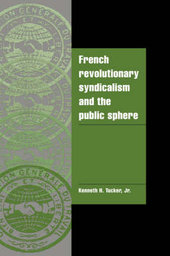
|
French Revolutionary Syndicalism and the Public Sphere
Hardback
Main Details
| Title |
French Revolutionary Syndicalism and the Public Sphere
|
| Authors and Contributors |
By (author) Kenneth H. Tucker
|
| Series | Cambridge Cultural Social Studies |
|---|
| Physical Properties |
| Format:Hardback | | Pages:296 | | Dimensions(mm): Height 236,Width 158 |
|
| Category/Genre | Labour economics |
|---|
| ISBN/Barcode |
9780521563598
|
| Classifications | Dewey:331.0944 |
|---|
| Audience | | Professional & Vocational | |
|---|
|
Publishing Details |
| Publisher |
Cambridge University Press
|
| Imprint |
Cambridge University Press
|
| Publication Date |
4 July 1996 |
| Publication Country |
United Kingdom
|
Description
This study explores the evolution of the Confederation Generale du Travail (CGT) and its interaction with the French public sphere, between 1900 and 1920. Kenneth Tucker examines the triumph of this productivism and instrumental rationality, in contrast with other visions of society and the future. He gives a Habermasian twist to the recent linguistic turn in labour history, focusing on the role of competing bodies of knowledge in influencing the self-understanding and strategies of the CGT. He also goes further to situate the rise of productivism within the social and cultural context of the French Third Republic.
Reviews"...this is a dense and ambitious study of French revolutionary syndicalism during the belle epoque that should be of interest to labor historians as well as to those interested in contemporary sociological theory." Elizabeth Sage, Journal of Modern History "Kenneth Tucker is to be congratulated for this formidable intellectual accomplishment...Scholars and students in history, sociology, and anthropology will find Tucker's work a valuable educational experience." Neil Smelser, Director, Center for Advanced Study in the Behavioral Sciences, Stanford "French Revolutionary Syndication and the Public Sphere is an original and highly documented book that explores the evolution of French syndicalist organization." Alberto Spektorowski, AJS "...a sensitive readeing of an historical case used to motivate a critical but sympathetic critique of contemporary social theory, and particularly the work of Habermas." Christopher K. Ansell, Social Forces
|